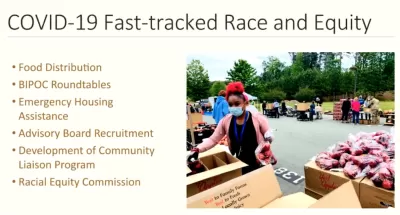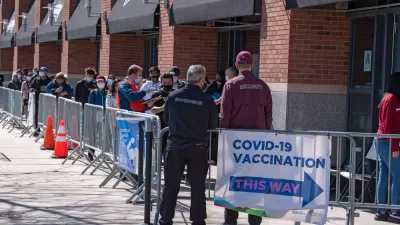The American Planning Association's 2021 National Planning Conference started streaming this morning, with an obvious focus on equity and the historical role of the planning profession in perpetuating systemic racism.

There's an obvious effort to make up for lost time in the proceedings of the 2021 National Planning Conference (NPC).
Yes, the 2020 NPC was canceled in March 2020 as the COVID-19 started to take a toll in the United States, prompting closures of businesses and events all over the country. But even the original scheduled date of April 2020 would have preceded a moment of historic reckoning for the planning profession, as the nation grappled with the deaths of Ahmaud Arbery, Breonna Taylor, George Floyd and so many more.
As noted by Valerie Jarrett, the event's opening keynote speaker, the questions raised by these needless deaths wasn't just about the police, and their treatment of Black, Indigenous, and People of Color. "What's our shared responsibility?" asked Jarrett, seeking a much larger audience for the reckoning that has been presented by the events of the past year.
Place yourself back in the historic moments of June 2020: The Black Lives Matter movement was swelling and protestors were taking to the streets on a daily, and nightly, basis. On the first day of the month, former President Donald Trump ordered a wave of tear gas and police to clear Lafayette Square and surrounding streets so he could pose with a Bible outside St. John's Episcopal Church near the White House.
The events of the month produced a steady stream of commentary and analysis about the numerous complicities of systemic racism. Prominent targets of criticism included the deliberate actions and unintended consequences of planning, both past and present. Not only did the field of planning face scrutiny for its participation in racist and discriminatory systems like racist zoning, redlining, and exclusionary zoning, it also played a role in more direct actions like slum clearance, urban renewal, and the construction of interstate highways through communities of color. The COVID-19 pandemic and its economic and social consequences had only exacerbated the disparate impacts of the planning status quo.
Critically, however, the moment of reckoning called on planners to do more than redress the racism of the past—planners were also being called on to recognize the consequences of the contemporary, ostensibly progressive, planning agenda.
It's clear that the APA isn't just making up for a missed conference; it's also faced with its first opportunity to address the criticisms and calls for reform from the crises and upheavals of the past year, and begin to pay more than just lip service to the causes of equity and anti-racism. Make up for lost time, indeed.
Morning Keynote
To their credit, the leadership of the American Planning Association (APA) barely let a moment pass in the conference's first moments before starting the discussion about race and equity. Chief Executive Officer Joel Albizo opened the day's events with repeated references to equity and highlighted the APA's "laser focus" on housing, climate, transportation, and broadband in furthering the goals of equity. Abizo also mentioned the need to reevaluate the AICP certification exam for potential bias.
APA President Leo Asuncion followed on the theme by mentioning the need for the profession to "right past wrongs," listing four key goals for the organization and the profession: 1) prioritizing equity, 2) reforming the voice of planning, 3) pursuing digital relevance, and 4) upscaling equity issues and digital skills.
Then Jarret took the digital stage. Jarret, who was the longest serving advisor to former President Barack Obama, the first Black president of the United States, after serving in the administration of former Mayor Harold Washington, the first Black mayor of Chicago. A question-and-answer format with Asuncion revealed Jarrett's exquisite skill with transforming a moment of crisis into inspiration. When asked what it was like to work for two trailblazers of racial representation in politics, and how those leaders seized their moment to achieve reforms, Jarret said, "Change seems impossible until it's inevitable." The task of "building back better," as the Biden administration has announced as its guiding principle in planning for economic recovery from the effects of the pandemic, is impossible without equity, said Jarrett.
Jarrett also charged every planner attending the conference to seize this historic opportunity to do big things and be a force for good. That's really the big challenge. The field's leadership has made a commitment and is saying the right things. It will be up to the country's thousands of planners to make these reforms a reality.
Morning Panel Sessions
I set forth from the keynote looking for examples of this charge in action in the presentations of the first few rounds of panel sessions, and I found multiple notable examples to discuss.
My first couple of sessions were filed under the "Planning Practice Innovation" program areas, where I immediately saw evidence of the event's new focus on equity. My first session, "Innovative Approaches for Comprehensive Planning," listed the following under its learning objectives:
Each planning effort has a focus on equity. One used data to improve transparency and participation in the planning process, another tapped into community resources to maximize health equity, and the third prioritized planning in areas with the deepest inequities and histories of segregation.
My second session, "Comprehensive Planning Under 2020 Lockdown: The Silver Lining!" promised to share information about the experience of Carrboro, North Carolina in launching its comprehensive planning process as a "Government Alliance on Race & Equity-Trained Community" during a pandemic. In setting the context for the session, Carrboro Planning Director Patricia McGuire said the names Ahmed Arbery, Breona Taylor, and George Floyd and also detailed the racist history of the town's founder.
In subsequent panels, I saw obvious responses to the criticisms listed above. Norfolk, Virginia Planning Director George M. Homewood listed several Equity Objectives while presenting information about the OpenNorfolk initiative during the "Overcoming Inequalities Uncovered During the Pandemic" session.
In the same session, San José Deputy Director of Citywide Planning Michael Brilliot described the city's plans for "Opportunity Housing" (the city's term for Missing Middle Housing) and Accessory Dwelling Units as a chance to rectify the racist legacies of single-family and exclusionary zoning. Brilliot's presentation was punctuated by the acknowledgement that the pandemic has had disparate impacts on Latino and Black community members in San José—some of which were caused by the consequences of previous planning decisions.
The Big Promise
It's too early to suggest that the field of planning has seen the light and will suddenly be the force for good that Valerie Jarrett hopes it can be. Clearly, the hearts of minds of many planners are in the right place. But we're just beginning to make up for lost time. It's critical to recall that while some of us have lost a year to the pandemic, others have lost decades, and even centuries to the legacies of systemic racism.

Planetizen Federal Action Tracker
A weekly monitor of how Trump’s orders and actions are impacting planners and planning in America.

Chicago’s Ghost Rails
Just beneath the surface of the modern city lie the remnants of its expansive early 20th-century streetcar system.

San Antonio and Austin are Fusing Into one Massive Megaregion
The region spanning the two central Texas cities is growing fast, posing challenges for local infrastructure and water supplies.

Since Zion's Shuttles Went Electric “The Smog is Gone”
Visitors to Zion National Park can enjoy the canyon via the nation’s first fully electric park shuttle system.

Trump Distributing DOT Safety Funds at 1/10 Rate of Biden
Funds for Safe Streets and other transportation safety and equity programs are being held up by administrative reviews and conflicts with the Trump administration’s priorities.

German Cities Subsidize Taxis for Women Amid Wave of Violence
Free or low-cost taxi rides can help women navigate cities more safely, but critics say the programs don't address the root causes of violence against women.
Urban Design for Planners 1: Software Tools
This six-course series explores essential urban design concepts using open source software and equips planners with the tools they need to participate fully in the urban design process.
Planning for Universal Design
Learn the tools for implementing Universal Design in planning regulations.
planning NEXT
Appalachian Highlands Housing Partners
Mpact (founded as Rail~Volution)
City of Camden Redevelopment Agency
City of Astoria
City of Portland
City of Laramie





























